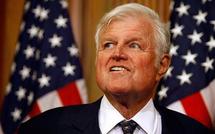End of an era for US as Ted Kennedy dies at 77
Sebastian Smith
HYANNIS PORT, Sebastian Smith - Edward Kennedy, the last of the storied band of brothers whose triumphs and tragedies dominated a generation of US politics, has died after losing his battle with brain cancer.
The "liberal lion" of the US Senate, once seen as an heir to his slain elder brother, president John F. Kennedy, died late Tuesday at his home in Hyannis Port, Massachusetts. He was 77.
"We've lost the irreplaceable center of our family and joyous light in our lives, but the inspiration of his faith, optimism and perseverance will live on in our hearts forever," the Kennedy family said in a statement.

As the Stars and Stripes was lowered to half-staff on all government buildings and in many private homes, especially close to the Kennedy family compound in Hyannis, President Barack Obama said he was "heartbroken."
"Even though we knew this day was coming for some time now, we awaited it with no small amount of dread," Obama said while on vacation on the east coast island of Martha's Vineyard across the Nantucket Sound from Kennedy's home.
"The outpouring of love, gratitude and fond memories which we have all witnessed is a testimony to the way this singular figure in American history touched so many lives."
Last year Kennedy defied the Democratic establishment by choosing not to support Hillary Clinton during the presidential primaries, throwing his weight behind Obama instead.
Already diagnosed with a brain tumor, Kennedy gave an emotional speech to the Democratic National Convention in August 2008 to back Obama and laud their shared commitment to health care reform.
"This is the cause of my life," Kennedy said of some 47 million Americans who lack health insurance. "The work begins anew. The hope rises again. And the dream lives on."
The speech came exactly a year to the day before Kennedy's death.
"This is the end of an era is so many ways," said Norman Ornstein, from the American Enterprise Institute. "There is no junior Kennedy coming forward who will have anywhere near the force of John, or Bobby (Robert), or Ted."
The Kennedy family patriarch will now be laid to rest on Saturday at the Arlington National Cemetery beside his brothers, president John F. Kennedy, who was assassinated in 1963, and Robert F. Kennedy -- shot dead in 1968 while campaigning for the White House.
"The nation's resting place for its heroes, Senator Kennedy spent more days than most at Arlington visiting the graves of his beloved brothers and paying tribute to the fallen men and women of Massachusetts who gave their lives for our country," an official statement said.
Democrats and Republicans alike Wednesday mourned his passing with Republican Senator Orrin Hatch lamenting the loss of his "treasured friend."
This "giant of a man," he said, "with all his ideological verbosity and idealism, was a rare person who at times could put aside differences and look for common solutions."
World leaders also praised Kennedy as "a great American" and paid tribute to his tireless campaigning for peace and social welfare.
"He is admired around the world as the senator of senators," said Britain's Prime Minister Gordon Brown.
Irish leaders hailed Kennedy as a "great friend" and trumpeted his role in helping Catholics and Protestants to live together in peace in Northern Ireland.
Kennedy died just two weeks after his sister, Eunice Kennedy Shriver, passed away at the age of 88. His body will lie in repose for the public to view on Friday at the John Fitzgerald Kennedy presidential library in Boston, before a private memorial service, a statement released by officials said.
There will be a funeral mass on Saturday morning, at a time yet to be decided, at Our Lady of Perpetual Help Basilica, also in Boston, before the burial service at Arlington, near Washington.
The youngest of the nine Kennedy children, Ted was the only Kennedy son not to die a violent death. Joe Kennedy, a pilot, died while on a World War Two bombing mission.
But he never fulfilled what many had seen as his political destiny, his White House hopes dashed after his name was tainted by scandal, drinking problems and a messy divorce.
In 1969, he drove off a bridge at Chappaquiddick in Massachusetts, killing a female companion -- Mary Jo Kopechne -- and leaving the scene of the accident.
The scandal doused his presidential hopes and he subsequently lost the Democratic party nomination to incumbent Jimmy Carter in the 1980 election.
Nevertheless, Kennedy easily won repeated re-election to the Senate as a progressive Democrat, becoming one of the most important voices in American politics.
A consummate deal-maker in the upper chamber of the US legislature, Kennedy forged sometimes unlikely alliances with more conservative politicians in pursuit of his causes, which ranged from civil rights and education to workers' rights and immigration reform.
Kennedy authored scores of legislative initiatives, but died before realizing his lifelong goal of transforming the US healthcare system.
-----------------------------------------------------------------------------------------------------------------------------